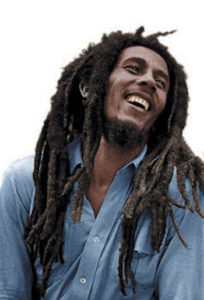
Bob Marley
*This date marks the birth of Bob Marley, an Afro Jamaican singer and songwriter, in 1945.
Bob Marley was born Robert Nesta Marley in rural Rhoden Hall in the Parish of St. Ann, Jamaica. His mother was a Jamaican teenager, and his father was a middle-aged captain in the West Indian regiment of the British Army. Marley's parents separated when he was six, and soon thereafter, he moved with his mother to Kingston, joining the wave of rural immigrants that flooded the capital during the 1950s and 1960s.
They settled in Trench Town, a west Kingston slum named for the sewer that ran through it. There, Marley shared quarters with a boy his age named "Bunny" Neville O'Riley Livingston. The two made music together, making a guitar from bamboo, sardine cans, and electrical wire and learning harmonies from local singer Joe Higgs.
Like a number of their generation, Marley and Bunny listened to radio from New Orleans, and they embraced the sounds of rhythm and blues, combining them with pieces of their musical style, producing a (then) new music called ska. Although encouraged by his mother to learn a craft, Marley soon abandoned an apprenticeship as a welder to devote himself to music. In the 1960s, Peter McIntosh (later Peter Tosh) joined Bunny and Marley's musical sessions, bringing a real guitar, and the three formed the Wailing Wailers. During this time, Marley recorded a few songs with producer Leslie Kong, who was introduced to him through local ska celebrity Jimmy Cliff.
Marley's earliest recordings received little radio play but strengthened his desire to sing. Joined by Junior Braithwaite and two backup singers, the Wailing Wailers recorded on the Coxsone label, supervised by Clement Dodd. The group became Kingston celebrities in the summer of 1963 with Simmer Down, a song that both indicted and romanticized the lives of Trench Town toughs, known as "rude boys." The Wailing Wailers recorded more than 30 singles in the mid-1960s, reflecting and sometimes leading the evolution of reggae from mento to ska to rock steady. In 1963, his mother moved to Delaware; Marley followed with a lengthy visit in 1966, working jobs for Chrysler and Dupont. Yet his heart lay back home, where his new wife, Rita Anderson, and his old passion for the island's music remained.
When he returned home in 1967, he converted from Christianity to Rastafarianism and began the mature stage of his musical career. Marley reunited with Bunny and Peter Tosh, and together they called themselves The Wailers and started their record label, Wail 'N' Soul. They abandoned the rude-boy philosophy for the spirituality of Rastafarian beliefs, slowing their music under the new “rock steady” influence. Although the Wailers began to fit together as a group, they did not find success beyond Jamaica. In 1970, bassist Aston "Family Man" Barnett and his drummer joined the Wailers. With this addition, the group attracted the attention of Island Records, a company that had started in Jamaica but moved to London.
In 1971, they recorded Catch a Fire, the first Jamaican reggae album to enjoy the benefits of a large budget and widespread commercial promotion. Catch a Fire sold modestly, better in Europe than America, but well enough to sustain the company's interest in the group. During the early 1970s, the band recorded an album yearly and toured extensively, slowly breaking into the European and American markets. They played shows with Americans Bruce Springsteen and Sly & the Family Stone, and in 1974, Britain’s Eric Clapton scored a hit with I Shot the Sheriff, a Marley composition.
The following year, The Wailers made their first major splash in the United States with No Woman No Cry and an album of live material. At this point, however, Peter Tosh and Bunny left the band; they then took the name Bob Marley & the Wailers. Although Marley had blended politics and music since the early days of "Simmer Down," as his success grew, he became more political. His 1976 song War transcribed a speech of Haile Selassie I, the Ethiopian king upon whom the Rastafarian sect was based. His lyrics probed the turmoil in Jamaica along with Rastafarian spirituality and mysticism. Before the 1976 elections, partisanship inspired gang war in Trench Town and divided the people against themselves.
By siding with Prime Minister Michael Manley and singing political songs, Marley angered some Jamaicans. After surviving an assassination attempt in December, he fled to London until the following year. When Marley returned to Jamaica in 1978, he performed in the One Love Peace Concert, seeking to improve existing political conflicts. Marley orchestrated a handshake between political opponents Manley and Edward Seaga during this show, a highly symbolic moment. Marley's activism extended beyond Jamaica, and people from developing nations found hope in his music.
The group's concerts in the late 1970s attracted enormous crowds in West Africa, Latin America, Europe, and the United States. In 1980, Bob Marley & the Wailers performed at the independence ceremony when Rhodesia became Zimbabwe. His music became closely associated with the movement toward Black political independence, prominent in several African and South American countries—the first global pop star to emerge from a developing nation.
Bob Marley, whose name more than anyone represents reggae music tenets of Rastafarianism and the struggle of the economically and politically oppressed, died May 11th, 1981. He died in Miami, Fl. at age 36 from cancer that began in his toe and spread throughout his body. The Jamaican government held a national funeral honoring his memory. He was inducted into the Rock and Roll Hall of Fame in 1994.
ASCAP Biographical Dictionary
R. R. Bowker Co., Copyright 1980
ISBN 0-8351-1283-1